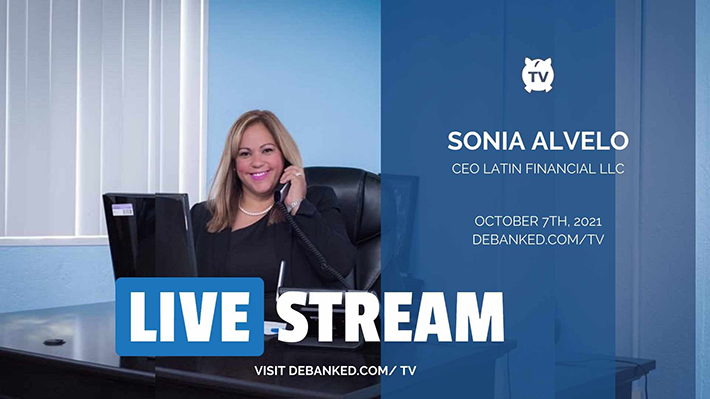Business Lending
Sonia Alvelo, CEO of Latin Financial Will Appear on deBanked TV
October 6, 2021 Sonia Alvelo, CEO of Latin Financial, will join Sean Murray live on deBanked TV on Thursday at approximately 12:15pm EST. Latin Financial is based in Newington, CT and Alvelo has contributed valuable insight to deBanked over the years, particularly on the Puerto Rican small business finance market.
Sonia Alvelo, CEO of Latin Financial, will join Sean Murray live on deBanked TV on Thursday at approximately 12:15pm EST. Latin Financial is based in Newington, CT and Alvelo has contributed valuable insight to deBanked over the years, particularly on the Puerto Rican small business finance market.
Anyone can tune in to debanked.com/tv/ for free without any registration to watch.
Who is Latin Financial?
A family owned and operated brokerage firm with a variety of backgrounds and expertise. We’re here to help all of our clients with their business’ unique financial needs. No loan is too big or too small for us; our goal is to simply help create a positive future for all of our clients. Here at Latin Financial, we understand that working capital can be difficult to obtain. With banks approving fewer and fewer loans, borrowing for your business’ future can be frightening and uncertain, especially in today’s economy. With Latin Financial you’re in good hands.
Latin Financial has over 10 years of business financial experience between its advisors.
We are at the forefront of this quickly changing economy and we work closely with our clients and investors because we are fully committed to meeting and exceeding expectations. We also believe in keeping our services affordable, working around your budget while never charging fees.
We are proud that so many of our clients have repeatedly turned to us for guidance and assistance with their business capital needs. We work hard to earn their loyalty every day.
Small Business Funders Are Hiring, But Does Anyone Want the Jobs?
September 28, 2021 As the small business finance market gets back to normalcy, the industry’s latest challenge is filling all of the open positions. Jobs that would once attract hundreds of resumés are now ending up with very few, if any at all.
As the small business finance market gets back to normalcy, the industry’s latest challenge is filling all of the open positions. Jobs that would once attract hundreds of resumés are now ending up with very few, if any at all.
Even after pursuing LinkedIn, the applicant pool just looks light.
In our research, deBanked found five fintech companies on LinkedIn that have ads that are at-least a week old with three or less applicants.
One company based on Long Island, promoted a $5,000 signing bonus for an underwriting position and only had five applicants. Meanwhile, a self-acclaimed “prestigious” Manhattan lender even has a month-old ad posted that offers a $10,000 per month salary. That job has one active applicant, according to LinkedIn.
Chad Carter, Director of Franchise Success at Lendio, says the hiring process has been difficult, but isn’t impossible to navigate. “Being based in Utah has been somewhat challenging as unemployment is extremely low and the Silicon Slopes area has a lot of tech headhunting,” said Carter. “We’ve hired and are hiring hundreds more people this year so we feel it too. Luckily we have extremely good reviews on Glassdoor, which helps keep applications coming and our culture keeps them here.”
 Some companies have gotten creative when it comes to building their staff to counter the lack of applicants in the workforce. “We have seen some open roles have more interest than others,” said James Webster, CEO of ROK Financial. He says his company has been able to expand hiring by offering remote sales positions that opens the applicant pool nationwide.
Some companies have gotten creative when it comes to building their staff to counter the lack of applicants in the workforce. “We have seen some open roles have more interest than others,” said James Webster, CEO of ROK Financial. He says his company has been able to expand hiring by offering remote sales positions that opens the applicant pool nationwide.
“We have been hiring and building an outside sales division known internally as the Remote Sales Division,” Webster said.
He claims the number of applicants for remote sales positions have been high, but that doesn’t mean his company is hiring a ton of staff to add to the program. “We are still extremely selective on who we allow onto the platform as they represent ROK in the market,” said Webster.
“All in all, recruiting is harder now than it has been in previous years,” Webster said. “Especially when the culture in the office is such a priority to maintain.” He noted that the roles that are currently difficult to fill are mostly administrative positions, not sales.
A recruiter for a large finance-centric company that wishes to stay anonymous told deBanked that the finance industry in general is having hiring troubles, not just fintech. “There’s tons of turnover all around,” said the recruiter, who claims that they themselves are actively being poached by other companies due to the lack of people wanting to work.
“I can only assume that fintech is just as crazy,” the recruiter said.
Miami May Become the New Small Business Funding Hub
September 22, 2021 At least two funding companies have told deBanked off the record that they plan on opening offices in the Miami area in the new year.
At least two funding companies have told deBanked off the record that they plan on opening offices in the Miami area in the new year.
It seems that South Florida, particularly Miami, is where the small business finance industry may be moving for a fresh start, and with that potentially ditching the suit and tie for flip flops and shades in the process. The social, political, and economical elements of South Florida make it a well-suited landing spot for an industry that is looking to evolve with the shifting environment.
One catalyst to the potential industry-wide migration could be the S5470B regulations that go into effect in New York on January 1. The new law will require funding companies to navigate a complex system of disclosure to any interested small business finance prospect.
There are other benefits to Florida, of course.
Jordan Fein, CEO of Greenbox Capital, whose operated his business out of Miami since 2012, prides his choice of locale on all the factors that are seemingly pushing those in New York down south. “We do not have state and city tax, we are near water and have a better lifestyle than most companies in New York, or in other areas where it gets very cold in the winter,” he said.
Fein stressed the relaxing Miami lifestyle as the reason why he has only called South Florida home to his company. “The lifestyle here is second to none. Being near the ocean, it makes it much more enjoyable to be able to go to the beach or on a boat to relax and take a load off from the busy work week. New York and other large cities seem to add more stress from [New York’s] super-fast-paced style.”
Despite his love for Miami, Fein respects New York’s ability to churn out top tier employees in the industry. “The talent pool is still among the best,” Fein said, when asked if there were any reasons he or others would ever consider maintaining a connection with the area should an exodus occur.
Fein isn’t worried about the incoming competition should offices relocate to his area. “Location of a funding company has no bearing on competition,” he said. “We all do business over the internet and the competition of funding is dependent on new companies entering the space, not on their location.”
If it is true that the industry is moving to a fully digital competitive space, the idea of a warm weather city with great tax benefits, comparatively low costs of living, and a low-stress atmosphere may be a no-brainer when it comes to finding the funding industry a much needed new home. Not to mention, the mayor of Miami also really wants small business finance companies to relocate there.
In a taped episode of deBanked TV, Miami Mayor Francis Suarez told reporter Johny Fernandez that he really wants small business lenders and MCA companies to set up shop in his city.
Watch: Miami Mayor Francis Suarez talks with deBanked in March 2021“We definitely want to make sure that small business, merchants, and lenders are able to capitalize small businesses in our community,” he said. “Miami’s a very thriving small business community. One of the things that people have criticized us for is we don’t have those big massive companies. We’re actually really built on small businesses. So for us, having fluidity of capital, liquidity of capital, access to capital are enormous things in terms of scaling. And I think that’s one of the things that we’re seeing change now is because of technologies. We’re getting a tremendous amount of access to capital that we weren’t getting before.”
New York DFS: The Commercial Financing Disclosure Requirement is Happening
September 21, 2021 New York State’s financial regulator announced that the commercial financing disclosure law is moving forward as planned for the Jan 1, 2022 deadline.
New York State’s financial regulator announced that the commercial financing disclosure law is moving forward as planned for the Jan 1, 2022 deadline.
To prepare those that will be subject to it, Acting Superintendent Adrienne A. Harris released a copy of proposed regulations that will be open to comment for 60 days.
Its length, 45 pages, demonstrates the complexity that compliance will require. Anyone involved in commercial or small business financing should take the careful time to read it.
“The Department of Financial Services will then review all received comments and issue a final regulation,” the announcement says.
Small Business Finance Industry Mulls Crypto, NFTs
September 16, 2021 As the crypto craze roars on, NFTs are starting to stake a claim in the finance world as a legitimate option for those looking to invest or stash money in a virtual space. The sports world recently took their swing at NFTs, and here at deBanked we minted NFTs of our own early this week. It seems that NFTs have sparked the interest of the media, athletes, and art enthusiasts— but in small business finance, the conversation is only in the early stages.
As the crypto craze roars on, NFTs are starting to stake a claim in the finance world as a legitimate option for those looking to invest or stash money in a virtual space. The sports world recently took their swing at NFTs, and here at deBanked we minted NFTs of our own early this week. It seems that NFTs have sparked the interest of the media, athletes, and art enthusiasts— but in small business finance, the conversation is only in the early stages.
“I think of it more not so much as a currency, but from what I’ve been reading, more of an investment vehicle,” said Noah Grayson, President of South End Capital, when asked what he thinks an NFT represents. “It’s a way for people to put tangible items in a digital format to get ownership from.”
Grayson says those in his industry have brought up the topic around the office, but it hasn’t made its way into any type of business practices yet. “It’s tough to see how [NFTs] would affect the lending industry at this time, cryptocurrency is something a little more probable in the long term.”
Grayson stressed how difficult small business lending can already be with dollars, and it seems as though the industry just isn’t ready to start conducting business in other types of currencies. “When you consider that many small business owners have no credit score and a large portion of those still pay for things in cash, I think it’s going to be a long time before the industry as a whole considers [crypto] an option to make loans with or compensate partners [with] as a whole,” he said.
“I’d describe it as a digital asset that can be purchased, owned, and used by an individual, giving that individual exclusive rights to the asset,” said James Webster, CEO and founder of ROK Financial when asked how he would define an NFT. “Like any other asset, the price can go up or down over time.”
Although his company has never created an NFT themselves, Webster won’t eliminate the possibility for one in the future. With the interest of the industry and his employees being focused around crypto as of late, Webster can’t keep the crypto and NFT talk out of the office.
 “We have a [clever] and nimble-minded staff at ROK. NFTs and crypto like other tradable assets are always being discussed and invested in here,” said Webster. “The team has been buying crypto for years now and I don’t see that slowing down any time soon.”
“We have a [clever] and nimble-minded staff at ROK. NFTs and crypto like other tradable assets are always being discussed and invested in here,” said Webster. “The team has been buying crypto for years now and I don’t see that slowing down any time soon.”
Webster believes it’ll inevitably make its way into the business with positive effects. “I see it streamlining, as well as making lending and banking for that matter more efficient over time,” he said.
At Velocity Capital Group, crypto has already seeped into the business. The company began offering commission payments to brokers this past August with an immediate positive reception. Velocity Capital Group CEO Jay Avigdor attributes “speed” as the primary use-case of crypto in his business.
“The feedback has been fantastic!” Avigdor said.
With crypto on the minds of fintech gurus everywhere, it’s evident its interest comes from the ability to put the technology in practice. Until these types of things can be borrowed, used to buy goods, or seen as a means of collateral at a mainstream level, the small business finance community will continue to eye their development and evolve if necessary.
A Drone Flew Through The Office of a Collections Company
September 15, 2021Dedicated Commercial Recovery combined modern tech and marketing, as the company released a live action virtual tour of their new offices via drone on Tuesday. The video showcased staff working in an upbeat, positive, one might dare say fun, environment.
The YouTube video is now the company’s most ever watched on their channel.
“We shot that video like eight times,” said Shawn Smith, Chairman and CEO of Dedicated Commercial Recovery. “It was such a cool concept, a way to showcase the new office,” he said.
Smith said the goal of the video was to show that his company’s staff was more than just debt collectors. “We want to show the outside world our culture,” said Smith. “Our team loved it.”
Filmed by Sky Candy Studios, drone marketing is an emerging concept in the world of promoting business.
Smith, who sits on several non-profit boards, wants to use the concept of drone marketing in his ventures outside of his collections company too. “I’m going to talk to the boards and associations I’m a part of, we would love to shoot events [this] way,” said Smith.
The video was also dedicated to the passing of a recent employee of Smith’s. Aubin Davis passed in mid-July and was commemorated at the conclusion of the video. “He was an industry veteran,” said Smith. “We wanted to honor him.”
Cannabis Boom Exposes Difficulties in Lending
September 15, 2021 The legalization of cannabis across the U.S. has exposed an interesting opportunity for banks and small business lenders. With tons of capital, insane amounts of cash flow, and an industry outlook that couldn’t be better, banks and lenders should be swarming in droves to get their hands on a piece of the legal marijuana action. Seemingly a match made in heaven, lenders and cannabis cultivators are running into some serious trouble when it comes to how the cash crop operators manage their businesses’ finances.
The legalization of cannabis across the U.S. has exposed an interesting opportunity for banks and small business lenders. With tons of capital, insane amounts of cash flow, and an industry outlook that couldn’t be better, banks and lenders should be swarming in droves to get their hands on a piece of the legal marijuana action. Seemingly a match made in heaven, lenders and cannabis cultivators are running into some serious trouble when it comes to how the cash crop operators manage their businesses’ finances.
“We had too much cash to keep in one place,” said Charles Ball, the owner of Ball Family Farms, a wholesale grow operation based in Los Angeles. By stashing cash in different safe-houses around LA, Ball had to operate his completely legitimate and legal business like an illegal operation. “Traditional banking wasn’t an option for us,” Ball said.
“We used to drive the cash around,” said Ball. For recent renovations of lighting fixtures, Ball had to pay $125,000 in cash to the company who did the service for him. Ball also paid taxes in cash, a process in which he had to walk into a Los Angeles government building with $40,000 cash on his person. At the time, there was no bank that was willing to hold the cash for him — even for tax purposes.
Prior to going fully cash, Ball did do business with some big banks, but he realized quickly that they weren’t interested in servicing his cash upon learning what his business was doing.
 “They closed my account for wearing a shirt with my business name on it, they put two and two together,” said Ball, when referencing the closing of two accounts with Bank of America and Chase after representatives of the banks saw him wearing his company shirt to make deposits. One of the biggest difficulties of running a cannabis distributor isn’t the growing or the distribution of the product, it’s what to do with the money, according to Ball.
“They closed my account for wearing a shirt with my business name on it, they put two and two together,” said Ball, when referencing the closing of two accounts with Bank of America and Chase after representatives of the banks saw him wearing his company shirt to make deposits. One of the biggest difficulties of running a cannabis distributor isn’t the growing or the distribution of the product, it’s what to do with the money, according to Ball.
“We had no way of banking,” he said, up until February of this year, when he was able to secure his first type of deposit account with a local bank in the Los Angeles area that was fully aware of what his business was doing. “I have to pay more fees, and I don’t get the same type of customer service, everything is different,” Ball said.
With service fees on his deposit account between $2,000-$3,000 per month, the security of doing business with a bank must be worth the price. When pursuing a loan with that bank to expand his operation however, the lending process was halted at the last second after federal regulators told the bank they wouldn’t allow the deal to go through.
“We were denied on the approval date [of the loan],” said Ball. According to him, the bank told him the FDIC stepped in and killed the deal. Once again, Ball Family Farms was forced to explore other options outside of banking, such as exploring renovation options through landlords or simply waiting until the cash is on hand to make the move. “The banking system in this industry is very flawed,” said Ball.
“We’ve never taken private investor money,” Ball said when asked about whether he had explored any other avenues of receiving a loan. “We took [the start] slowly and it works, we are a ground up operation.”
This problem is not unique to Ball Family Farms. Legal cannabis cash flow has been a major issue since legalization first took place in the states. It seems like local governments want the tax revenue, but the bank’s regulators want to make it difficult for lenders to get their hit off the cash pipe until the federal government changes the law on their end.
The opportunity for funding in the industry isn’t going unnoticed however, as cannabis-exclusive funders and brokers are beginning to pop up across the U.S.
Judy Rinkus, for example, CEO of Seed to Sale Funding, is a Michigan based broker who works exclusively with cannabis businesses.
 “[The industry’s] biggest problem is simply finding a lender who isn’t prohibited from lending to cannabis-related concerns,” said Rinkus. According to her, one of the biggest issues is the infancy of the industry, as many cannabis wholesalers and retailers just haven’t been around long enough to be reliable borrowers.
“[The industry’s] biggest problem is simply finding a lender who isn’t prohibited from lending to cannabis-related concerns,” said Rinkus. According to her, one of the biggest issues is the infancy of the industry, as many cannabis wholesalers and retailers just haven’t been around long enough to be reliable borrowers.
“Most businesses have been established for 3 years or less, they haven’t kept good financial records, and accept a lot of cash payments, and they lack sufficient collateral,” Rinkus said.
Rinkus stressed the importance that real estate plays in giving cannabis businesses borrowing power. “Having real estate to pledge as collateral is key,” she said. “There are ways to get other types of loans, but they are often enormously expensive and are limited to no more than 10% of an entity’s historic revenues.”
Rinkus’ outlook on the industry remains positive, and she remains a supporter despite the difficulties associated with cannabis lending. “Businesses in this space are the true American entrepreneurs,” said Rinkus. “In many areas of the country, they are creating jobs and wealth for folks that would otherwise not have the same chances.”
The outlook on the industry is bright. More states are pushing for legalization, social taboo of marijuana is relatively nil, and the potential of an untapped industry in the eyes of both government and banking are becoming too good to pass up. As the industry begins to cultivate its presence, look for the money surrounding cannabis to creep its way into fintech sooner than later.
Lenders, Funders Look to Expand as 2021 Heads Into Final Stretch
September 14, 2021 As the year ends, lenders and funders across the globe are looking to meet goals, help businesses, and close the books on some of the most unpredictable months the industry has ever seen. Whether it comes to improving technology, hiring more staff, or creating completely new concepts on how to do business, any company worth its salt isn’t just going to be content with just staying stagnant.
As the year ends, lenders and funders across the globe are looking to meet goals, help businesses, and close the books on some of the most unpredictable months the industry has ever seen. Whether it comes to improving technology, hiring more staff, or creating completely new concepts on how to do business, any company worth its salt isn’t just going to be content with just staying stagnant.
“Our main goal for this year’s end is to scale our small business loan and MCA deal flow in order to maximize our syndication opportunities, which we want to overtake commission as our primary revenue stream,” said Zack Fiddle, President of CapFront. “We’ve already built a robust CRM and marketing automation system over the past year, we have great people and a proven process and product, and we just moved to a much larger space.”
From a brand-new office in Garden City, Fiddle seems to be expanding his company on multiple fronts. “The next step for us is hiring more support staff and more account managers to handle more leads from increased media [spending] and more referrals from our various business development channels,” he said.
Other fintech brands are looking to come up with new ideas surrounding borrowing. “We are coming out with a special lawyer loan,” said Justin Leto, co-founder and CEO of Miami-based Idea Financial, whose recent announcement about LevelEsq will allow the firm to divi out loans to attorneys who wait to get paid until when —or if — their client wins. “We’ll have the only insurance product that is available on the market that will cover the downside risk that the case [the attorney] is borrowing on goes to trial and loses.”
“It’s a really exciting time here at Idea Financial because we are able to leverage a lot of our existing resources and expertise to enter an entirely new market, which is legal lending,” said Larry Bassuk, co-Founder and President of Idea Financial.
Other firms are taking the current political and social climates into consideration when it comes to their end-of-year plans. “[We’ll] be analyzing risk a little more in case there is another lockdown,” said Drew Matthew, CEO of Infusion Capital Group. The two-person firm doesn’t plan to expand their staff too much going into the new year, but Matthew did flirt with the idea of bringing on an ISO-rep as his business expands.
“I think we’re going to pick up dramatically,” said Matthew when asked about the number of his future clients. “Once there’s no more [covid restrictions], SBA money, or no more fear of another pandemic shutdown, no matter what [we charge], the small businesses in America need us.”
This risk and surrounding political climate have no influence on the location of Infusion Capital’s offices in the future. “I know everyone is going down to Florida, but not us,” said Matthew. “New York or nowhere, baby.”
As seasons change and the year ticks its final months, lenders, much like the businesses they support, are looking to find the next best way to edge out competitors while offering the best product and services for their customers.





























